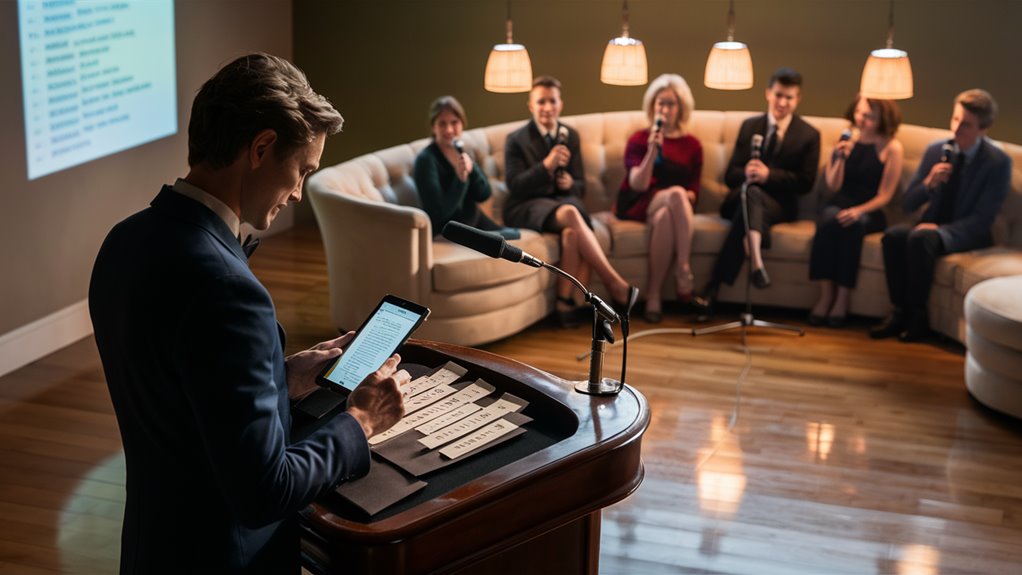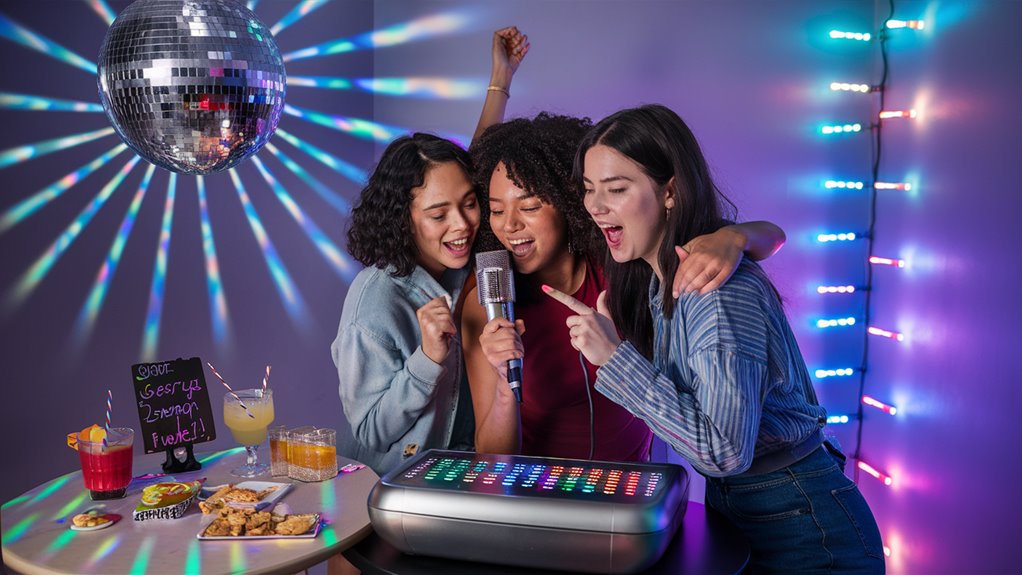How to Host a Great Karaoke Night at Your Big Party

Set up the best karaoke night by considering key factors that make a typical gathering an unforgettable event. Follow these five major steps to host the ultimate singing party.
Great Equipment Setup
Utilize high-quality karaoke gear such as a professional system with two cordless microphones and clear monitors. Properly position audio equipment with speakers at ear height to ensure top sound quality. Check for backup power and test all equipment before guests arrive.
Wise Song Selection
Choose a variety of songs with 40-50 popular tunes from different genres:
- Big rock hits
- Latest pop songs
- Classic love tracks
- Fun dance music
- Top country songs
Smart Use of Space
Arrange your party area for maximum enjoyment:
- Seating in a semi-circle for optimal acoustics
- Proper lighting to read lyrics
- Designated spaces for performing
- Ample viewing spots for all
Plan for Food and Drinks
Organize party snacks and beverages as follows:
- 3-4 drinks per person
- 4-6 small plates per person
- Alcohol and soft drinks
- Simple, easy-to-eat foods
Create a Fun Agenda
Have a plan but keep it flexible for singing times:
- Scheduled times for solo performances
- Times for group singing
- Include ‘Name That Tune’ games
- Short rest intervals
- Big finale songs
All You Need for a Karaoke Setup
Main Equipment Requirements
A professional karaoke setup requires key components for a top-notch show. Start with an advanced karaoke system featuring a quality amplifier and excellent speakers. For major setups, consider a mixing board connected to specialized PA speakers for vocals.
Audio Parts and Mic Arrangement
Choosing quality microphones is perfect karaoke crucial for sound. Obtain:
- Two cordless mics for lead and backup
- Sturdy mic stands with neat cable management
- XLR cables and reliable audio connections
- Digital sound equipment for computer integration
Monitor and Software Needs
The karaoke monitor setup requires thoughtful planning. Set up a sharp TV at a suitable height for viewing. Essential software includes:
- Karaoke apps with numerous songs
- Lyric synchronization tools
- Song management software
- Video adjustments
Professional Lights and Stage
Stage lights enhance the karaoke experience. Choose:
- LED lights with adjustable settings
- DMX light controllers for ambiance
- Dimmed light setups
- Spotlights for special effects
Maintain Gear Safely and Ready
Ensure the setup works flawlessly with:
- Surge protectors for all devices
- Backup power sources
- Extra cables and components
- A kit with backup mics
- Digital versions of songs and settings
The Top Karaoke Song Choices

Essential Song Selection Strategy
Create an outstanding karaoke song playlist across genres and eras. Start with 40-50 beloved songs that engage everyone and maintain the fun.
Must-Have Fun Hits
Party tracks are excellent starters:
- Don’t Stop Believin’ by Journey
- Sweet Caroline by Neil Diamond
- I Will Survive by Gloria Gaynor
- Popular current pop songs
- Sing-along classics from the 60s to the 90s
Wise Song List Plans
Main Categories
- Duets
- Party tunes
- Slow songs
- Tracks for each mood
Maintain at least 5-6 tracks per category for a good variety. Consider guests and their music preferences when compiling your list. Add guest favorites for more engagement.
Backup Song Alternatives
Keep a secondary song list of 15-20 additional tracks for:
- Switching out weaker options
- Longer events
- Accommodating special requests
- Maintaining the event’s flow
This smart approach ensures smooth operation and keeps everyone engaged.
Optimal Karaoke Room Arrangement
Crucial Equipment Positions
Proper speaker placement is crucial for sound quality. Position speakers at ear level, slightly lower, and three feet away from walls to reduce sound issues. The main performance area should be against a solid wall, away from windows and doors for optimal acoustics.
